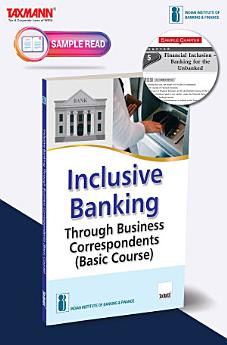IIBF X Taxmann's Inclusive Banking Through Business Correspondents (Basic Course) – Essential resource for BCs handling basic transactions like deposits, payments, cash-in cash-out, etc.
About this ebook
This book has been developed under the guidance of the Indian Banks' Association (IBA) and the Reserve Bank of India (RBI). It adopts a modular approach, ensuring a coherent and logical flow of content across its four modules, which are as follows:
• General Banking
• Financial Inclusion and Role of Business Correspondents
• Technical Skills
• Soft Skills and Behavioural Aspects
It is an invaluable resource for practising bankers and institutions seeking a deeper understanding of financial inclusion, the BC/BF model, and the certification aspirants.
The Present Publication is the 2024 Edition, revised and updated by Mr K.S. Padamnabhan | Retd. CGM – NABARD. Taxmann exclusively publishes this book for the Indian Institute of Banking and Finance with the following noteworthy features:
• [Economic Significance] Emphasizes the role of the BC/BF model in supporting India's rural economy by connecting unbanked populations with banking services
• [Objective of BC/BF Model] Explains the purpose of the BC/BF model in reaching excluded individuals and offering banking services in areas without bank branches
• [Operational Risks and Skill Requirements] Discusses the operational and reputational risks involved for banks in engaging BCs and the necessary skill sets required for effective performance
The detailed contents of this book are as follows:
• Module A – General Banking
o Structure of Indian Banking and types of banks
o Deposit schemes and other banking services
o Account opening procedures and KYC mechanisms
o Grievance redressal and the Integrated Ombudsman Scheme
• Module B – Financial Inclusion and Role of Business Correspondents
o Concept and need for financial inclusion
o BC and BF model as a vehicle for financial inclusion
o Risk and fraud management in the BC/BF context
o Government schemes like PMJDY, PMJJBY, PMSBY, and APY
• Module C – Technical Skills
o Basic technical skills for handling various banking devices and connectivity issues
o Overview of digital banking products
• Module D – Soft Skills and Behavioural Aspects
o Importance of communication and financial counselling
o Strategies for dealing with different types of customers
Ratings and reviews
- Flag inappropriate
About the author
Established in 1928 as a Company under Section 25 of the Indian Companies Act, 1913, the Indian Institute of Banking & Finance (IIBF), formerly known as The Indian Institute of Bankers (IIB), is a professional body of Banks, Financial Institutions, and their employees in India.
The Institute is managed by a Governing Council comprising representatives of major Banks, the Reserve Bank of India, the Indian Banks' Association, the Institute of Banking Personnel Selection and an academician from the Indian Institute of Technology, Bombay.
During its 93 years of service, IIBF has emerged as a premier institute in Banking and Finance education for those employed and seeking employment in the sector and aiming for professional excellence. Since its inception, the Institute has awarded several Banking and Finance qualifications, viz., JAIIB, CAIIB, Diploma and Certificates, covering diverse and contemporary subjects in the Banking & Finance domains. Moreover, IIBF is the only Institute that offers all the courses mandated by the Reserve Bank of India for capacity building in banks. In addition, contemporary courses and training programmes have helped industry professionals sustain their professionalism through continuing professional development programmes.
IIBF offers a bouquet of courses on Banking & Finance to meet the needs and aspirations of the banking & finance personnel and students aspiring for a career in the banking & finance sector.








